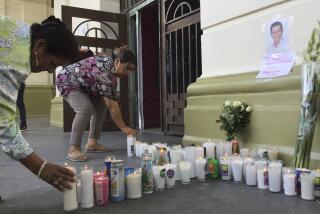Alexis Arguello dies at 57; winner of three world boxing titles
- Share via
Alexis Arguello, who battled his way to three world boxing titles in the ring but lost several bouts with personal demons outside the ropes, was found dead early Wednesday at his home in Managua, Nicaragua. He was 57.
Police are investigating the death and an autopsy is pending, according to a government spokeswoman. Arguello, who was elected mayor of Nicaragua’s largest city last year, suffered a gunshot wound to the chest. Several media outlets, quoting official sources, said Arguello shot himself.
The government declared three days of mourning in Nicaragua, where Arguello was widely considered the greatest athlete in that nation’s history. His coffin, accompanied by a police escort, was driven through the main streets of the capital Wednesday afternoon, allowing citizens to pay their respects.
“He was the consummate gentleman,” Bob Arum, Arguello’s former promoter, said Wednesday. “After every fight that I promoted for him, about an hour after the press conference, he would show up in my suite with a jacket and a tie on and thank me. No other fight I ever promoted did that.
“He came from a tough background, but he always comported himself as a gentleman. People would forget he was an athlete he was so charming.”
Arguello won 82 of 90 professional fights, 65 by knockout, in a 27-year career that ended with induction into the International Boxing Hall of Fame. Considered the best pound-for-pound fighter in the world for much of his career, the rail-thin Arguello never lost at 130 pounds and was just the sixth man to win world titles in three weight classes -- featherweight, super featherweight and lightweight.
Arguello’s most memorable fight ended in defeat, however, when Aaron Pryor knocked him out in the 14th round of an epic 1982 junior welterweight bout at Miami’s Orange Bowl that many consider one of the greatest of all time. The victory became clouded in controversy after Pryor’s trainer, Panama Lewis, gave his boxer a drink from a water bottle rumored to contain an illegal substance. Pryor denied the accusations and met Arguello in a rematch a year later at Caesars Palace in Las Vegas, knocking him out in the 10th round.
Arguello retired after the second loss to Pryor only to stage two brief comebacks, the first in 1985, when he won two fights, and again in 1994, when he split two bouts before quitting for good.
One of eight children of a shoemaker and his wife, Arguello was born April 19, 1952. He grew up on the streets of Managua’s poorest neighborhood in poverty so acute that when Arguello was 5 his father attempted suicide by jumping into an abandoned well. Four years later, Arguello’s parents told him they could no longer afford to send him to school, so the boy ran away to work on a dairy farm.
Arguello frequently credited memories of his difficult childhood for giving him the strength he needed to survive in the ring. But he experienced hardship in other ways too.
With his country wracked by civil war in the late 1970s, Arguello’s brother Eduardo joined the Sandinista rebels. But shortly before the war ended Eduardo was wounded, captured and burned alive by government forces.
That bought Arguello little goodwill with the Sandinistas, however, and after the rebels came to power in 1979 they confiscated everything he left behind, including two houses, a boat, two luxury cars and his bank account, citing a picture of the boxer posing with the hated dictator Anastasio Somoza at a parade as evidence of his government sympathies.
“I wasn’t posing with Somoza,” Arguello would say years later. “He was posing with me.”
Peace also eluded Arguello in Miami, where he endured three failed marriages and a brush with bankruptcy. That’s also where he faced his toughest opponent, drug and alcohol abuse, a foe that would shadow him the rest of a life in which, like his father, he often talked of suicide.
After the Sandinistas were voted from power, Arguello returned home to open a gym and direct the country’s amateur boxing program.
In recent years, he had allied himself with the Sandinista party, becoming deputy mayor of Managua in 2004, carrying the Nicaraguan flag in the opening ceremony of the Olympic Games in Beijing last summer, then winning election as mayor of Managua in November.
His survivors include nine children.
More to Read
Start your day right
Sign up for Essential California for the L.A. Times biggest news, features and recommendations in your inbox six days a week.
You may occasionally receive promotional content from the Los Angeles Times.







